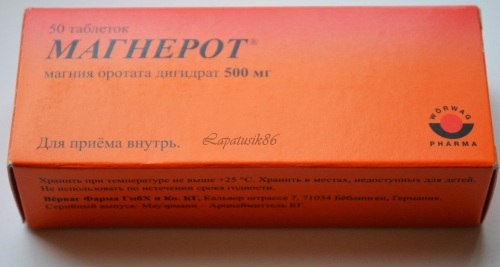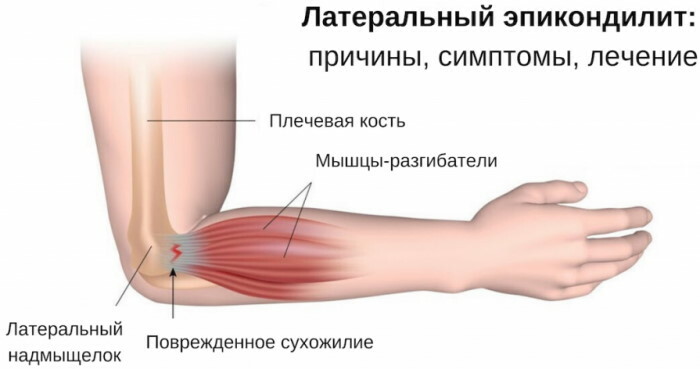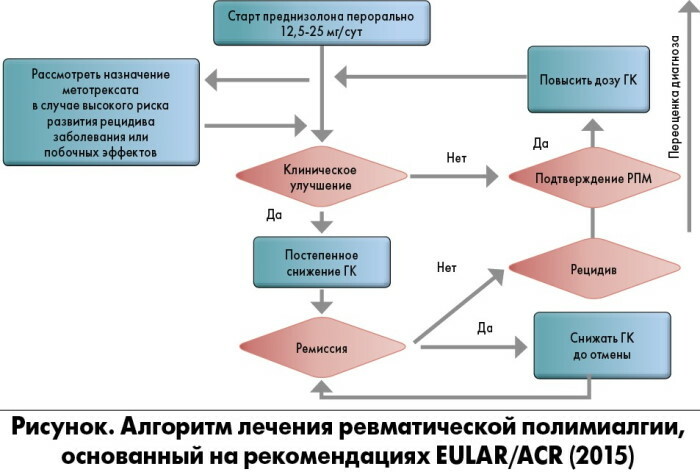Content
- Views
- Stages and degrees
- Symptoms
- Reasons for the appearance
- Diagnostics
- When to see a doctor
- Treatment methods
- Medications
- Traditional methods
- Other methods
- Possible complications
- Stuttering video
Logoneurosis of adults is violation of fluency and tempo of speech, in which there are fuzzy words or sounds, there are forced pauses and difficulties. Speech disorders, treatment is dealt with by the science of speech therapy in close cooperation with a neurologist and psychiatrist.
Views
Stuttering, which occurs in adults, manifests itself only in communication with others, if the disorder is not associated with organic brain damage.
Logoneurosis is divided into 2 types:
- Stuttering neurotic in nature. The reason is a stressful situation.
- An organic disorder or logoneurosis of a neuro-like form. It occurs under the influence of mechanical damage to the brain. This occurs with birth trauma, tumors, strokes, oxygen deprivation, or ongoing inflammatory processes. The symptoms of stuttering in this case in a person do not depend on his emotional state. Stuttering in this case is accompanied by convulsive twitching of the facial muscles, various body movements.
In medicine, according to the characteristics of convulsive movements, there are 3 types of stuttering:
- Clonic. In this case, muscle spasms, which are involved in the pronunciation of sounds, contribute to the involuntary duplication of consonants, individual syllables or words.
- Tonic. Prolonged contraction of the muscles of the mouth, throat, leads to a delay in speech, lengthens the pauses between words, a person constantly repeats vowels and some voiced consonants.
-
Mixed type. It combines movements 1 and 2.
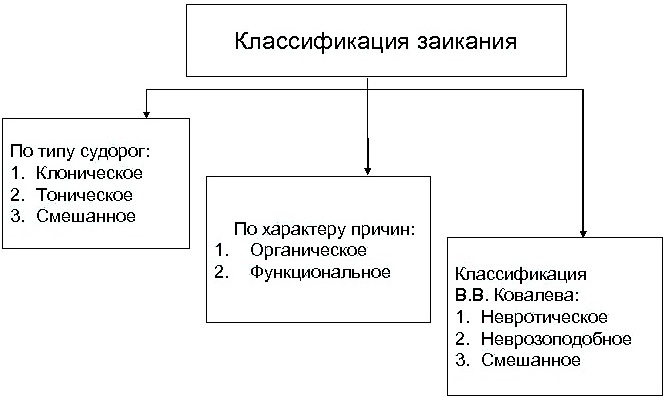
Logoneurosis in adults (treatment is much more difficult than in children) in many cases has childhood roots. Whatever the root cause, neurotic or organic, the disease does not go away with age by itself, but becomes persistent, which greatly complicates the treatment. Treatment should begin at the first sign of stuttering, even in childhood.
Stages and degrees
Stuttering can be permanent or temporary. Symptoms worsen when a person is nervous, worried.
By the nature of the course of the disease, the following stages are distinguished:
- Constant. After the onset of a speech disorder, stuttering is present in all situations associated with the need to communicate through speech.
- Intermittent. Speech problems sometimes disappear and reappear. It is associated with emotions, stress.
- Periodic. Stuttering can disappear for a certain period of time, a person will forget about it, and then it comes back again under the influence of unfavorable factors.
Symptoms
Noticeable signs of stuttering: frequent hiccups before speaking words, unwillingness to continue the conversation, self-doubt during the conversation. Often, people try to avoid talking by nodding their heads, simply assenting, avoiding public speaking.
Visible symptoms of logoneurosis:
- lengthening of sounds in words, unusual for ordinary speech;
- repeated repetition of individual sounds, syllables, or even words;
- tense expression of muscles and the whole face;
- shortness of breath, lack of air;
- unwillingness to start a conversation;
- neurotic state before the start of the conversation.
Reasons for the appearance
Logorneurosis in adults (treatment depends on the cause of the disorder) has slightly different consequences than in children. If children experience only psychological discomfort during communication, then an adult's stuttering affects his social life. Speech disorder is very often an obstacle to career development, family creation and life comfort.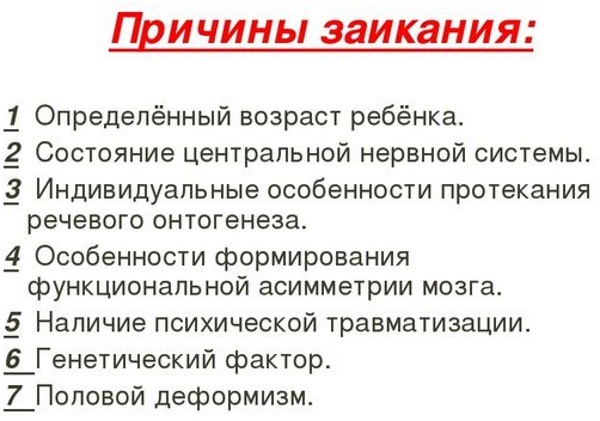
The main factor that influences the development of stuttering in adults is not well understood. In medicine, there are various theories explaining the pathogenesis of this disorder. Many are inclined to believe that several factors are involved in its development. This makes it difficult to pinpoint the exact cause of stuttering.
In 19% of patients with this disorder, there was a genetic predisposition to it.
And yet, the main reasons were identified:
- Organic brain damage. Diseases of the head, central nervous system, and brain injuries cause stuttering due to abnormal nerve impulses. This form of the disorder is characterized by convulsive contractions of the facial and respiratory muscles. When talking, patients, in addition to muscular contractions of the face, perform motor activity with their hands and head.
- Neurotic reasons. Stresses, difficult situations experienced in youth, emotional experiences leave an imprint on speech. Logoneurosis often manifests itself before public speeches and competitions. At the same time, stuttering has a short duration.
- Incorrect or incomplete treatment of logoneurosis in childhood. Incomplete therapeutic actions aimed at eradicating stuttering in children lead to the fact that the disorder becomes chronic. In this case, treatment in adults will take longer and harder.
- Hereditary factor. This category includes diseases of the brain that are of a genetic nature, physiological characteristics of a person, and a hereditary predisposition.
In adults, the causes of logoneurosis often affect the duration of treatment.
Diagnostics
Stuttering is not immediately diagnosed. Small pauses between words, rare repetition of words and syllables are not always indicative of a disorder. Minor speech disorders may indicate strong excitement, haste, or, conversely, thoughtfulness.
Some moments of speech (singing, lengthened pauses between words) may be distinctive features of a particular race or geographic region. Temperament can also contribute to changes in speech characteristics.
Moreover, it is not enough to diagnose "stuttering", it is necessary to determine to which neurotic type refers to this speech disorder, as this will determine the correctness and effectiveness of the chosen methods treatment.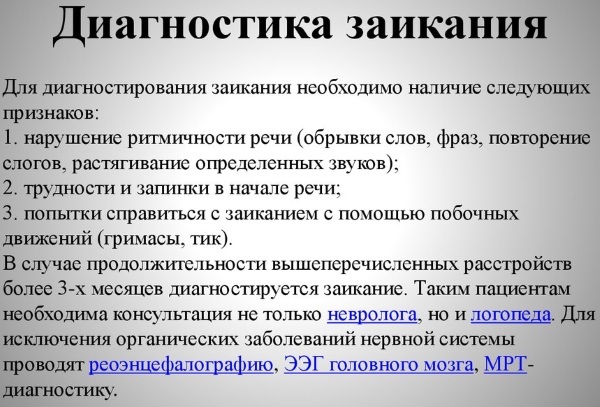
The specialist can prescribe various tests (blood and urine), as well as instrumental diagnostics, which can reveal organic brain damage at different stages. Instrumental methods in this case include MRI (tomography) of the brain and an electroencephalogram (EEG).
All adults have many differences. It is necessary to determine the cause of the speech disorder in order to understand which treatment methods will be most effective.
This is a differential diagnosis with the participation of a speech therapist, psychologist, neurologist, psychiatrist based on a complete medical history, using the results of instrumental and laboratory research can lead to a complete picture of the disease, establish or disprove hereditary predisposition to develop a plan for the effective control of this pathology.
When to see a doctor
Previously, you can make or refute the diagnosis of stuttering by performing a couple of tests:
- Count the number of unnecessary pauses by speaking a 100-word text. Up to 7 breaks is the norm. More than 10 pauses - a high probability of developing speech pathology.
- Trace facial expressions. If your facial muscles look tense during a conversation, there is a chance of speech impairment. This is evidenced by the presence of pauses between words lasting from 1 to 30 seconds.
These tests are not accurate research methods, but are only a reason to start a more thorough professional diagnosis.
Treatment methods
Logoneurosis in adults (treatment depends on the severity) has in its solution several aspects related to the physiology, socialization and mental state of a person. And only a comprehensive treatment covering all these aspects can give good results.
Treatment options for adult stuttering depend on whether the speech disorder is neurotic or organic. Treatment for an organic type of stuttering comes down to dealing with the problem that gave rise to it.
And since the cause of this stuttering is a serious disturbance in the functioning of the brain, often complicated by a genetic factor, the treatment of stuttering and its root causes can take months or years.
Neurotic stuttering in adults is much easier and more successful to treat. An integrated approach is provided for him, including medication and alternative treatment prescribed by a neurologist, as well as systematic work with a speech therapist, a psychologist and psychotherapist who will help the patient restore the normal rhythm of speech, overcome fears, join the normal rhythm of life, establish communication.
Medications
The method of treatment with drugs has as its goal the elimination of convulsive syndrome and stabilization of the central nervous system, which are responsible for the occurrence of various nervous reactions.
Medicines prescribed in this case can be divided into 3 groups:
- nootropics that improve brain function;
- sedatives, relieving nervous tension;
- antispasmodic, which have an anticonvulsant effect.
| A drug | Action | Appointment | Dosage | Contraindications | Price, in rub. |
Nootropics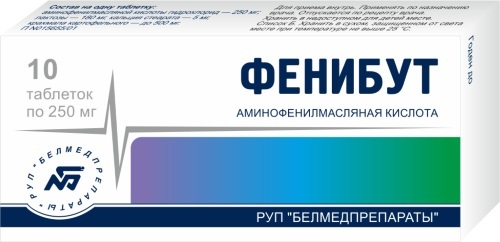 | |||||
| Phenibut | Analgesic, psychostimulating effect, prevents the formation of clots in the vessels of the brain, the destruction of body cells and promotes their regeneration. | This medicine can be prescribed by a doctor as a medicine for a neurotic disease, which is expressed in the form of fear of communication. | Phenibut tablets can be taken at any time of the day, preferably after meals, by swallowing the tablet whole. | pregnancy and lactation, liver failure, hypersensitivity to the drug component. The drug has practically no side effects. Drowsiness may occur at the beginning of the pill. The same symptom, especially in combination with nausea and vomiting, may indicate an overdose of the drug. | 260 |
Sedatives | |||||
| Afobazol | A tranquilizer that does not cause addiction. | Its action is aimed at eliminating anxiety, fear, and the associated nerve, muscle and respiratory reactions. | It is recommended to take the drug after meals in the amount of 1-2 tablets (10 mg) three times a day. Usually, the course of treatment lasts 14-28 days, but if necessary, the doctor can increase the dosage (up to 60 mg per day) and the duration of the course up to 3 months. | Pregnancy and lactation, individual intolerance to the drug or its individual components, as well as age less than 18 years. | 400 |
| Novopassit | A preparation based on a rich collection of plants (valerian, lemon balm, St. John's wort, hawthorn) | It has a good sedative and sedative (anxiolytic) effect. Available in the form of tablets or solution (syrup). | The usual single dose is 1 tablet or teaspoon of syrup (5 ml), in pure form or diluted with water. The drug is taken 3 times a day before meals. If the drug causes depression, the morning and evening doses are halved, while the daily dose remains unchanged. | Age under 12 years old, myasthenia gravis (genetic neuromuscular disease), individual intolerance to the drug or its components. Side effects: discomfort in the digestive tract (changes in density, stool), less often dizziness and drowsiness, as well as allergic manifestations and weakness. | 250 |
Antispasmodics | |||||
| Magnerot | An anticonvulsant drug replenishes the magnesium deficiency in the body, which causes seizures and hyperexcitability | Of antispasmodics with stuttering in adults, doctors usually prescribe Midocalm, Magnerot and Finlepsin in combination with vitamin B preparations. |
Taking the drug can be divided into 2 stages: 7-day course: 2 tablets 3 times a day. At week 2: 1 tablet 2-3 times a day. The full course of treatment is 2 to 4 weeks, sometimes more. The tablets are drunk with a little water before meals. |
Diseases of the kidneys and liver, stones in the bladder, lactose intolerance and lactase deficiency, age up to 18 years, as well as individual drug intolerance. Side effects: Frequently encountered are changes in stool frequency and quality and immune response. | 400 |
Many drugs have contraindications, such as kidney and liver diseases, bladder stones, lactose intolerance and lactase deficiency, age up to 18 years, as well as individual intolerance.
Traditional methods
Many patients, and most often their relatives, tend to treat stuttering at home. But at home, there is no way to implement an integrated approach to treatment. But exercising at home is possible if you learn some self-help elements first, such as self-study, self-hypnosis, breathing exercises, for example, according to the Strelnikova method, using elements of yoga.
Various breathing exercises for adults, in accordance with Strelnikova's system, should be based on correct breathing. during the execution of movements: a sharp inhalation and a long calm quiet exhalation, the active participation of the diaphragm during breathing process. All active movements (squats, head turns, body bends) are performed only by inspiration.
Speech gymnastics at home contributes to the development of correct breathing during a conversation.
Examples of tongue twisters for training speech and breathing:
- In the yard there is grass, on the grass, firewood: once firewood, two firewood - do not chop wood on the grass of the yard.
- In advertising, hooks are seams with coverage, and potholders and without coverage are snapped up.
- Our head overtook your head, overdid it.
 Aromatherapy has a positive effect. All the ethers found in essential oils are able to ease nervous tension and soothe fears. These include oils of bergamot and pine, rose and sandalwood, rosemary and basil, sage and geranium, lavender. The inhalation procedure should be repeated 3 times a day.
Aromatherapy has a positive effect. All the ethers found in essential oils are able to ease nervous tension and soothe fears. These include oils of bergamot and pine, rose and sandalwood, rosemary and basil, sage and geranium, lavender. The inhalation procedure should be repeated 3 times a day.
Aromatic oils mixed with kefir can be used for bathing. To do this, take 100 g of a fermented milk product and add 5-6 drops of any of the above essential oils to it. The oil-kefir mixture is added to the warm water bath.
Logoneurosis in adults (treatment includes herbal remedies) can be stopped with herbs in the form of decoctions and infusions.
Here are some of them:
- Take 5 g of fragrant rue, grind, add 2 glasses of water and boil for 5 minutes.
- Filter and cool slightly. Hold the hot broth in your mouth until it is completely cool. The procedure is repeated very often (at least 6 times a day).
- Prepare a herbal collection of chamomile, mint, nettle and valerian, taking 0.5 g of each herb.
- Pour the herbal mixture with a glass of boiling water and keep on fire for 15 minutes. Drink ½ cup infusion 2 times a day.
Other methods
In addition to drug treatment, patients with logoneurosis are indicated by hypnosis and acupuncture. One of the methods of therapy is the help of a speech therapist, who either corrects existing speech skills, or instills new, correct ones. About half an hour after these exercises, massage procedures are prescribed.
Stuttering massage in adults is presented in the form of reflexology (acupressure) and osteopathy (impact soft massage on the muscles), which have a positive effect on the articulatory vocal apparatus and respiratory system.
At the third stage of treatment of stuttering in adults, therapeutic exercises, a pool and a sauna are shown.
There are many different methods of complex impact on the problem using various speech systems training, from visual communication to public speaking in a team (groups of patients with the same problem).
Physiotherapy treatment for stuttering, in addition to reflexology and osteopathy, includes:
- Darsonvalization of the muscles of the face and neck is the effect on the muscles with an alternating current of high frequency and voltage, but with low force and short-term effect of sinusoidal currents on the larynx.
- Procedures for the restoration and optimization of central nervous system functions (electrotherapy, therapeutic baths and massage, franklinization, alpha massage, various types of relaxation).
Possible complications
Stuttering can lead to problems:
- Difficulty communicating with other people.
- Constant avoidance of situations requiring speech.
- Loss of social or work participation in production, career ladder.
- Getting ridiculed and bullied by other people.
- Low self-esteem.
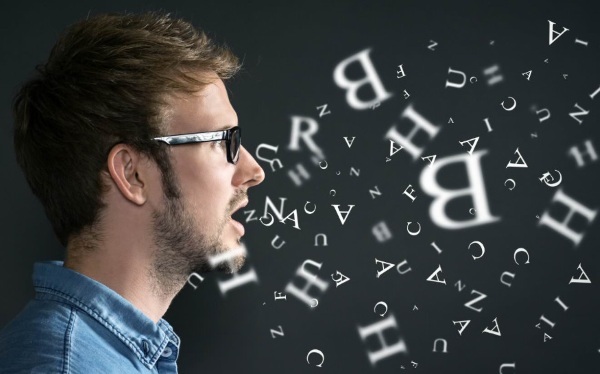
If treatment is not started on time, stuttering can take on a chronic form, when a person has stereotypes of behavior and speech skills, and over time, the fear of communication develops, causing a strong anxiety. Nervous reactions of the face and body, self-doubt, fatigue from conversation, deterioration of mood, and a decrease in life comfort can join verbal disorders.
A visible positive result can be obtained only with a strong desire of the patient to get rid of the rhythmic speech defect. Relatives and friends can provide significant psychological support and assistance in the treatment of logoneurosis. The treatment of an adult can be long, and he must be ready for it, be patient and activate his willpower.
Stuttering video
About logoneurosis:

